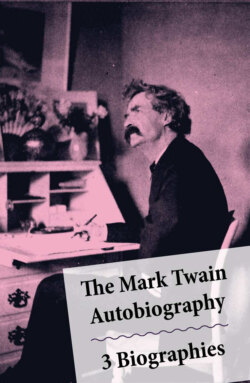Читать книгу The Mark Twain Autobiography + 3 Biographies - Mark Twain - Страница 44
На сайте Литреса книга снята с продажи.
V.
ОглавлениеTable of Contents
At that time I had become editor of The Atlantic Monthly, and I had allegiances belonging to the conduct of what was and still remains the most scrupulously cultivated of our periodicals. When Clemens began to write for it he came willingly under its rules, for with all his wilfulness there never was a more biddable man in things you could show him a reason for. He never made the least of that trouble which so abounds for the hapless editor from narrower-minded contributors. If you wanted a thing changed, very good, he changed it; if you suggested that a word or a sentence or a paragraph had better be struck out, very good, he struck it out. His proof-sheets came back each a veritable “mush of concession,” as Emerson says. Now and then he would try a little stronger language than ‘The Atlantic’ had stomach for, and once when I sent him a proof I made him observe that I had left out the profanity. He wrote back: “Mrs. Clemens opened that proof, and lit into the room with danger in her eye. What profanity? You see, when I read the manuscript to her I skipped that.” It was part of his joke to pretend a violence in that gentlest creature which the more amusingly realized the situation to their friends.
I was always very glad of him and proud of him as a contributor, but I must not claim the whole merit, or the first merit of having him write for us. It was the publisher, the late H. O. Houghton, who felt the incongruity of his absence from the leading periodical of the country, and was always urging me to get him to write. I will take the credit of being eager for him, but it is to the publisher’s credit that he tried, so far as the modest traditions of ‘The Atlantic’ would permit, to meet the expectations in pay which the colossal profits of Clemens’s books might naturally have bred in him. Whether he was really able to do this he never knew from Clemens himself, but probably twenty dollars a page did not surfeit the author of books that “sold right along just like the Bible.”
We had several short contributions from Clemens first, all of capital quality, and then we had the series of papers which went mainly to the making of his great book, ‘Life on the Mississippi’. Upon the whole I have the notion that Clemens thought this his greatest book, and he was supported in his opinion by that of the ‘portier’ in his hotel at Vienna, and that of the German Emperor, who, as he told me with equal respect for the preference of each, united in thinking it his best; with such far-sundered social poles approaching in its favor, he apparently found himself without standing for opposition. At any rate, the papers won instant appreciation from his editor and publisher, and from the readers of their periodical, which they expected to prosper beyond precedent in its circulation. But those were days of simpler acceptance of the popular rights of newspapers than these are, when magazines strictly guard their vested interests against them. ‘The New York Times’ and the ‘St. Louis Democrat’ profited by the advance copies of the magazine sent them to reprint the papers month by month. Together they covered nearly the whole reading territory of the Union, and the terms of their daily publication enabled them to anticipate the magazine in its own restricted field. Its subscription list was not enlarged in the slightest measure, and The Atlantic Monthly languished on the news-stands as undesired as ever.
